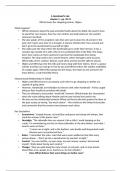A Handmaid’s tale
chapter 5 - pp. 30-31
Offred meets her shopping partner, Ofglen
What happens?
• Offred reminisces about the past and talks fondly about the ability she used to have
to spend her own money, have her own clothes and walk wherever she wanted
whenever she liked.
• She also speaks of the unspoken rules that were put in place for all women in the
past; don’t open your door to a stranger, if anyone whistles don’t turn around and
don’t go to the laundromat by yourself at night.
• She walks past the shop where the handmaids go to order their dresses, it has a
wooden sign outside of it with a lily on it to symbolize lilies of the field. The shops
don’t have names on them anymore to prevent the handmaids from being
tempted. The shop used to be a movie theatre, where teenagers went to party,
Offred talks of the ‘undone’ blouses, back when women had the right to choose.
• Ofglen and Offred go into the milk and honey shop with their tokens, there’s a queue
outside and they can only go in two by two and Offred notices the sudden availability
of oranges again. Offred likes going into the shops, she hopes to see someone she
knew before, a real friend like Moira.
Interpersonal Relationships in Gilead
• Ofglen and Offred have to accompany each other to go shopping as neither are
capable of going alone
• However, Handmaids are forbidden to interact with other Handmaid - if they caught
doing so they would be punished with death.
• They are allowed to have polite “small talk” however Offred breaks the ‘boundaries’
when she starts talking about Mayday and the past society that used to be.
• We also see the relationship between Offred and Aunt Lydia who pushes the ideas of
the past society as having “too much choice” - this reinforces the limited interaction
and connection that the women have between each other.
Key Quotations
• Econowives: “striped dresses, red and blue and green and cheap and skimpy, that
mark the women of the poorer men.”
• Nostalgia: “The sidewalks here are cement. Like a child, I avoid stepping on the
cracks. I'm remembering my feet on these sidewalks, in the time before, and what I
used to wear on them.”
• “I never ran at night; and in the daytime, only beside well-frequented roads.
Women were not protected then.”
• Rules: “I remember the rules, rules that were never spelled out but that every
woman knew: … Don't go into a laundromat, by yourself, at night.”
• Control: “my own clothes, my own soap, my own money, money I had earned
myself. I think about having such control.”
• Change: “Now we walk along the same street, in red pairs, and no man shouts
obscenities at us, speaks to us, touches us. No one whistles.”
• Does Offred believe that some things are better now?




